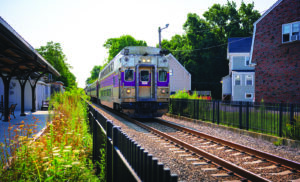
An inbound MBTA commuter rail train pulls into the Scituate station. The MBTA Communities law forced many suburbs with commuter rail service to designate multifamily zones near their stations. iStock photo
The MBTA Communities law was, by most accounts, an earnest swing at using state power to spur more housing in cities and towns served by the MBTA system. But at the nation’s largest pro-housing conference, there was some decided ambivalence about whether the Massachusetts approach has worked out as hoped.
Organizations that spent the past four years boosting and working to implement the law told their peers in other states that the tailored town-by-town approach is complicated, inefficient and ultimately not enough to address a severe housing crunch. While MBTA Communities tried to accommodate a tradition of local control and sense of community ownership, they said, it created too much room for foot-dragging and resistance.
Advocates said the shortcomings of the 2021 housing law argue for more muscular state zoning reform that leads to substantial new construction and limits cities’ and towns’ ability to flout state mandates.
Legislative appetite for strengthening the housing law, however, is minimal.
“I think MBTA Communities was really optimistic, in that we thought local communities would want to control their own zoning, and they’d go through these processes in good faith,” said Will Rhatigan, MBTA Communities engagement manager for the Citizens’ Housing and Planning Association, a non-profit housing advocacy organization, at a panel at the national YIMBYtown 2025 conference in mid-September. “And many of them did, but it took so much effort, so much time, that I don’t think we could realistically do it again for any other zoning reform. We’ve eaten up that political capital.”
Mass. Spotlighted at National Conference
The “YIMBY,” or Yes In My Back Yard, movement is focused on a relatively simple pitch: Addressing the housing crisis requires building more housing, at all price points, in most places. The name is a counter to the pejorative “NIMBY,” or Not In My Back Yard, characterization of people and areas who may say there is a need for more housing, but their immediate vicinity is not the right place to put it.
Discussion of Massachusetts housing policy at the national conference – which drew over 1,000 attendees to New Haven, Connecticut – kept returning to the MBTA Communities law. Passed in a 2021 economic development bill, the housing law said that cities and towns with MBTA service “shall” zone for a multi-family district of “reasonable size” near that transit.
The 177 cities and towns affected by the law had to vote in compliant zoning, “which opens up a whole bunch of headaches,” said Jesse Kanson-Benanav, executive director of the pro-housing advocacy group Abundant Housing Massachusetts. Not the least of those, he said, is the firestorm around a few dozen municipalities forcefully objecting and sparking lawsuits across the state.
“We crafted this law in a way that we thought was responding to the unique aspect of local control, local decision making, Town Meeting form of government we have in Massachusetts, but that made it incredibly difficult,” he said.
Between the nonprofits, quasi-public agencies, state agencies, and others, he estimated tens of millions of dollars and hundreds of thousands of hours of staff time have so far “gone in to implementing this act that is really monumental for Massachusetts, but ultimately, in and of itself, is not going to get us to the 200,000-plus homes that we need to build in the next 10 years just to meet the expected demand for housing.”
Some Towns Eager, Others Defiant
Some communities like Lexington, Arlington, and Brookline took up the rezoning task briskly. Others dug in their heels, criticizing the law as “one-size-fits-all” and placing an unreasonable burden on towns with limited zoning capacity.
The wealthy Boston suburb of Milton initially approved a plan that would comply at its 2023 Town Meeting, only for voters to toss the plan by referendum early the next year. It was the first municipality to miss its deadline for compliance, and other towns like Holden, Winthrop and Marshfield (the first municipality to sue the state over MBTA Communities) indicated their intention to ignore the law as well.
They seemed to be banking on the only consequence being the loss of four grants specifically named in the original legislation, which Massachusetts Assistant Attorney General Eric Haskell noted was considered a minor issue for a number of municipalities.
“It wasn’t a very big stick,” he said at a YIMBYtown panel, adding that the attorney general’s office decided to sue Milton in a way that would get fast-tracked to the state Supreme Judicial Court.
“Frankly, our audience for that lawsuit on one level was Milton,” Haskell said. “On another level, it was the other hundred-something municipalities that were facing deadlines six or 12 or 18 months down the road. We wanted to set the precedent, so to speak.”
The state’s high court in January 2025 handed the AG’s office broad power to enforce state law. The state housing office would have to put out regulations again properly, the court ordered. Once new regulations were in place, the attorney general was free to enforce the law with all of her available powers.
Of the 177 MBTA Communities, 140 have submitted or adopted zoning to comply with the law, according to state data. As of Sept. 15, the state determined 116 of these plans are fully or conditionally compliant, and 15 have refused to adopt compliant zoning by their July 14 deadline. Some of the noncompliant towns are also suing the state, while others are waiting for court rulings before acting.
Only 5.2K Homes in Pipeline
Polling on the MBTA Communities law, and more development near transit generally, finds it to be reasonably popular among residents.
But some local resistance is pronounced enough that the Republican candidates for governor, including the economic development chief during the Baker administration that signed the law in the first place, are hammering the Healey administration approach as an unacceptable intrusion into local governance.
The state credits the housing law with 5,200 homes built or in development so far.
“In the broadest strokes, my sense of the original intent of the law was to require all communities near transit to adopt a zone that allowed for modest multifamily housing, and I think the law has really led to movement in that direction,” said Luc Schuster, executive director of Boston Indicators, a research center at the Boston Foundation.
“What it was not designed for and has not done is lead to tens of thousands of new housing units, the scale of which would really make a dent in the region’s affordability crisis,” Schuster said in an interview after the conference.
Hobbled by Local Control Focus
Panelists all said unified statewide rezoning is on their wish list, with clear ways to enforce the law. They pointed to the recent housing bond bill, which legalized accessory dwelling units by right wherever single-family homes are allowed, as a good example of just planting a flag and telling the municipalities to get on board.
“I think we are going to be able to do zoning changes,” said Katharine Lacy, program manager for the MBTA Communities technical assistance program with the Massachusetts Housing Partnership. But the MBTA Communities model isn’t ideal, she said, because of how much work it took to tailor each municipality’s plan, even as organizations streamlined the process of connecting cities and towns with resources and consultants.
“It was too effing complicated,” she said.
Lacy was involved in creating the MBTA Communities policy documents, but “we made it too hard.” When it comes to broader scale upzoning, she said, “I think we can do it, but I think we need to keep it simple. We need to assume there’s going to be some bad blood and some good faith effort.”
While the MBTA Community process did offer a chance for advocacy groups – and opponents of the law – to build organizing muscle across the region, Massachusetts YIMBYtown attendees say the process became an energy and attention sink.
“The Legislature says, ‘All I’m hearing is the horror stories around MBTA Communities, and what I’m hearing from the NIMBY voices in my town makes me think that no one wants to do any other zoning reform,’” Kanson-Benanav said. “I believe strongly that those are in the minority… but the fact that we focus so much on the local control over implementation, and the design of this law, has made some of those important future reforms very, very difficult.”
This article first appeared on CommonWealth Beacon and is republished here under a Creative Commons Attribution-No Derivatives 4.0 International License.![]()






